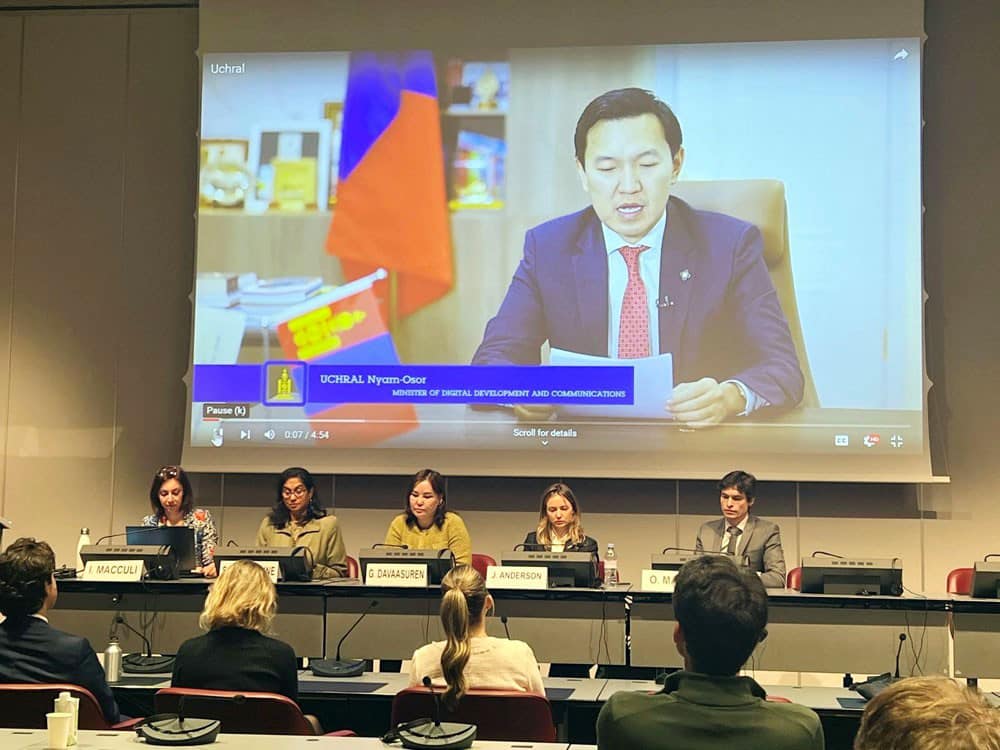

Mongolian delegation, led by Permanent Representative of Mongolia to the United Nations Office at Geneva D.Gerelmaa, participated in the eWeek of the United Nations Conference on Trade and Development (UNCTAD) under the theme “Shaping the future of the digital economy” in Geneva, Switzerland on December 4-8. As part of the E-Week, a meeting was held to present the “eTrade Readiness Assessment of Mongolia” report written jointly by the Government of Mongolia and UNCTAD in 2022-2023.
The meeting was opened by Mongolia’s Minister for Digital Development and Communications N.Uchral and UNCTAD Director of Technology and Logistics Division Shamika N. Sirimanne, and the Permanent Representative D.Gerelmaa chaired the meeting. At the meeting, the main results and recommendations of Mongolia’s e-commerce readiness assessment were presented, and international organizations and development partners exchanged ideas and held discussions in the framework of further work and initiatives to develop e-commerce and e-ecosystem in Mongolia.
eTrade Readiness Assessment of Mongolia is the 33rd assessment conducted by UNCTAD. It identifies the main barriers and opportunities for e-commerce development in the seven eTrade for all policy areas (E-commerce assessments, ICT infrastructure and services, payment solutions, trade logistics, legal and regulatory frameworks, skills development, and access to financing) by providing a detailed diagnostic of the digital ecosystem and identifying key policy reforms to accelerate the transition to an inclusive and sustainable digital economy.
The main findings per policy area were, firstly, Mongolia is in the initial phases of e-commerce development. Therefore, elaborating an e-commerce strategy is crucial to enhance interministerial coordination and foster public-private dialogue. This will ensure that the various initiatives undertaken by key players are aligned and that the needs of stakeholders are taken into consideration. Second, while Mongolia has a relatively well-developed ICT infrastructure, the speed and quality of Internet connection are still low compared to regional and international standards. Additionally, households in rural areas continue to face limited access to the Internet.
Third, trade logistics and trade facilitation are major challenges in Mongolia. Mongolia’s large territory, coupled with aging infrastructure, negatively impacts the competitiveness of the transport services sector. Improving cross-border trade and logistics is perceived as the most pressing factor for fostering e-commerce development. Fourth, e-banking, mobile banking, digital wallets, QR code payments and payment cards are widely used for domestic electronic transactions in Mongolia. However, the availability of cross-border payment options is limited. Fifth, Mongolia’s e-commerce regulations only partially align with international standards and are not widely known among stakeholders. Implementation of these regulations also remains a challenge.
Sixth, developing ICT skills is crucial for the future growth of e-commerce in Mongolia. There is a significant mismatch between the skills required for e-commerce and what is covered in formal education curricula. Although efforts are underway to improve access to digital solutions, most educational institutions lack the necessary equipment and qualified personnel to ensure effective learning. Finally, limited access to financing presents a significant entry barrier for Mongolian micro, small, and medium-sized enterprises looking to engage in e-commerce. While there are some financing options available for digital and technology innovation startups, seed funding sources are limited, as most institutional lenders or grantors require evidence of organizational continuity.
This assessment includes a series of recommendations in the Action Matrix with an indication of the expected results, level of priority and supporting government institutions and stakeholders in developing the e-commerce sector in Mongolia. The assessment was prepared with the financial support of the Republic of Korea, as well as the technical and financial support provided by the European Bank for Reconstruction and Development.